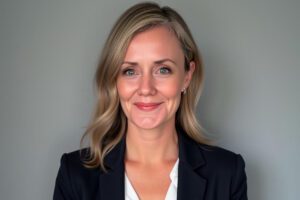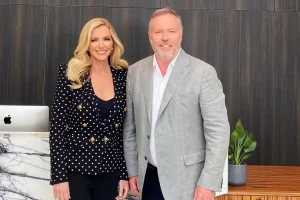Julie Kendall is a communications and technology professional based in Kittery, Maine. With over a decade of experience supporting critical operations for Fortune 500 companies and government agencies, Julie has worked in high-demand sectors like satellite communications and robotics.
Her career highlights include time with GlobaFone/East Coast Satellite Communications and UVD Robots, a division of Blue Ocean Robotics. Outside of her professional work, Julie is deeply committed to child advocacy, having served as a CASA (Court Appointed Special Advocate) volunteer in New Hampshire for seven years, advocating for children in cases of abuse and neglect. Julie’s career is built on a foundation of resilience, compassion, and a passion for innovation that serves real human needs.
What is your typical day, and how do you make it productive?
My days are a mix of client communication, problem-solving, and strategy sessions. Whether I’m helping a company understand how to implement new technology or reviewing project milestones, I stay productive by setting clear intentions each morning. I build out a simple list of three must-do priorities—and make sure those are the first things I tackle before I get pulled into email or meetings.
How do you bring ideas to life?
I usually start by talking it throughout loud with a trusted colleague or even just writing it down in a notebook. I think practical first—what need are we solving? I’ve learned that the best ideas stay simple and directly support the people you’re trying to serve. From there, I sketch out the steps backward: what would it take to make this real?
What’s one trend that excites you?
Robotics in healthcare still excites me. Watching how automation and technology can protect patients and hospital staff—like using UVC robots to disinfect operating rooms—reminded me that tech isn’t just about speed or money. It can genuinely save lives if it’s used the right way.
What is one habit that helps you be productive?
Honestly, it’s getting outside. I make time every day to take even a short walk without screens. It resets my thinking and reminds me that constant noise isn’t the same thing as productivity.
What advice would you give your younger self?
Don’t wait for perfect conditions. Start messy. I spent too much time early on waiting for more experience, more information, or more confidence. Growth happens when you just begin—even if you don’t feel ready.
Tell us something you believe almost nobody agrees with you on.
I believe that sometimes the most important part of communication is knowing when not to say anything. In our world, where everything is instant and loud, restraint and listening are underrated skills.
What is the one thing you repeatedly do and recommend everyone else do?
I regularly check in with myself by asking: “Is this moving me toward or away from who I want to be?” It’s a simple filter but incredibly powerful for decisions both big and small.
When you feel overwhelmed or unfocused, what do you do?
I break the cycle by doing something physical and offline—walking, cleaning, even just standing outside with a cup of coffee. Shifting gears for 10 minutes almost always brings clarity.
What is one strategy that has helped you grow your business or advance in your career?
Showing up consistently—even when it’s boring. Consistency is what builds trust, whether you’re managing a client relationship or building a reputation inside a company. Small, steady actions add up faster than one big move.
What is one failure in your career, how did you overcome it, and what lessons did you take away from it?
Early in my career, I once mishandled a complex client situation because I assumed rather than clarified. It nearly cost us the project. I learned to slow down, ask questions, and make absolutely sure everyone is aligned—even if it feels repetitive. Miscommunication is one of the fastest ways to lose trust.
What is one business idea you’re willing to give away to our readers?
Create a simple digital guide that teaches small nonprofits how to adopt affordable communication technologies. So many grassroots groups struggle with staying connected simply because they don’t know the tools exist or how to implement them.
What is one piece of software that helps you be productive? How do you use it?
Google Keep. It’s nothing fancy, but I use it for quick lists, notes, and reminders. It keeps my brain uncluttered without overwhelming me with features.
What is the best $100 you recently spent? What and why?
I bought a set of high-quality noise-canceling earbuds. They’ve been a game-changer for focusing during deep work sessions—and they also make my morning walks much more enjoyable with podcasts or the Aura app.
Do you have a favorite book or podcast you’ve gotten a ton of value from and why?
One book that sticks with me is Essentialism by Greg McKeown. It taught me that saying no is just as important as saying yes—and that energy spread thinly doesn’t help anyone.
What’s a movie or series you recently enjoyed and why?
I really enjoyed The Bear on Hulu. It’s chaotic but honest. It shows how hard work, communication (or the lack of it), and personal resilience shape outcomes in high-pressure environments. Plus, it reminds me a lot of the organized chaos you sometimes face in both healthcare, client services, working in restaurants through college and working as a corporate event planner.
Key Takeaways from Julie Kendall’s Interview:
Innovation doesn’t have to be flashy—it just needs to solve real problems.
Listening and consistency are underrated tools for long-term success.
Simplicity and intention create clarity, both professionally and personally.
Read more:
Staying Connected: How Julie Kendall Balances Innovation, Advocacy, and Real-World Solutions
















